Wolverhampton Wanderers are a defensive juggernaut. In the race for seventh place, they’ve opened up a four point lead over Watford. And, while they trail sixth place Arsenal by nine points, their numbers suggest they may be closer to the Gunners than the Hornets when it comes to the underlying level of their performances. As it stands, this newly promoted Wolves side is a favorite to qualify for Europa League football. How they’ve done it is fascinating. It’s not uncommon for a newly promoted Premier League team to be praised for their defensive moxie. Usually what that means is that they have an uncommon ability to absorb pain. They sit back, defend in numbers, and hope to outlast better opposition. Usually that means a defense that’s somewhere in the range of the 13th to 14th best in the league for a team struggling to stay on the ride side of the relegation line between 17th and 18th. So, for example, Huddersfield with their 1.33 expected goals conceded per match and Cardiff with their 1.36 might qualify. They’re 14th and 15th in the league respectively. That’s not what Wolves are. Wolves aren’t a good defensive team relative to expectations of them as a newly promoted side. They’re just plain old good. They’re an eye popping third in the league when it comes to xG conceded. 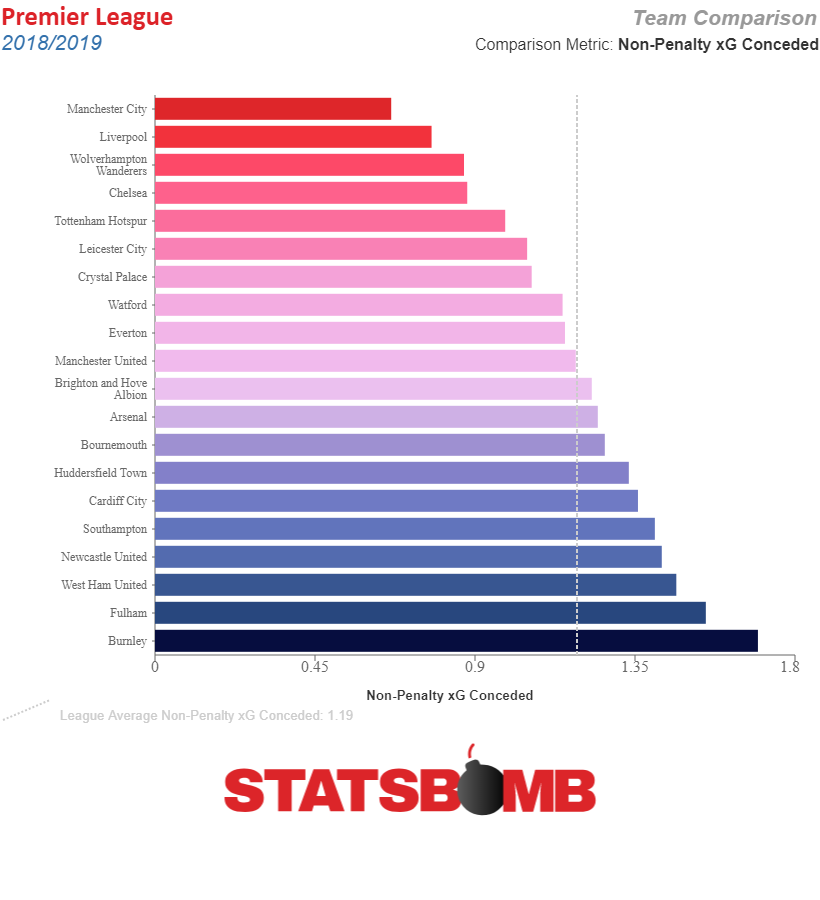 They’re also not aggressive. In a league where the best teams tend to press a lot and focus on defending as far away from their own goal as possible, Wolves are happy to wait for opponents to come to them. They maintain positional discipline and keep their midfielders behind the ball. The midfielders provide a robust shield for three center defenders sandwiched between two fairly conservative wingbacks. The result is a defensive heatmap that looks like this.
They’re also not aggressive. In a league where the best teams tend to press a lot and focus on defending as far away from their own goal as possible, Wolves are happy to wait for opponents to come to them. They maintain positional discipline and keep their midfielders behind the ball. The midfielders provide a robust shield for three center defenders sandwiched between two fairly conservative wingbacks. The result is a defensive heatmap that looks like this. 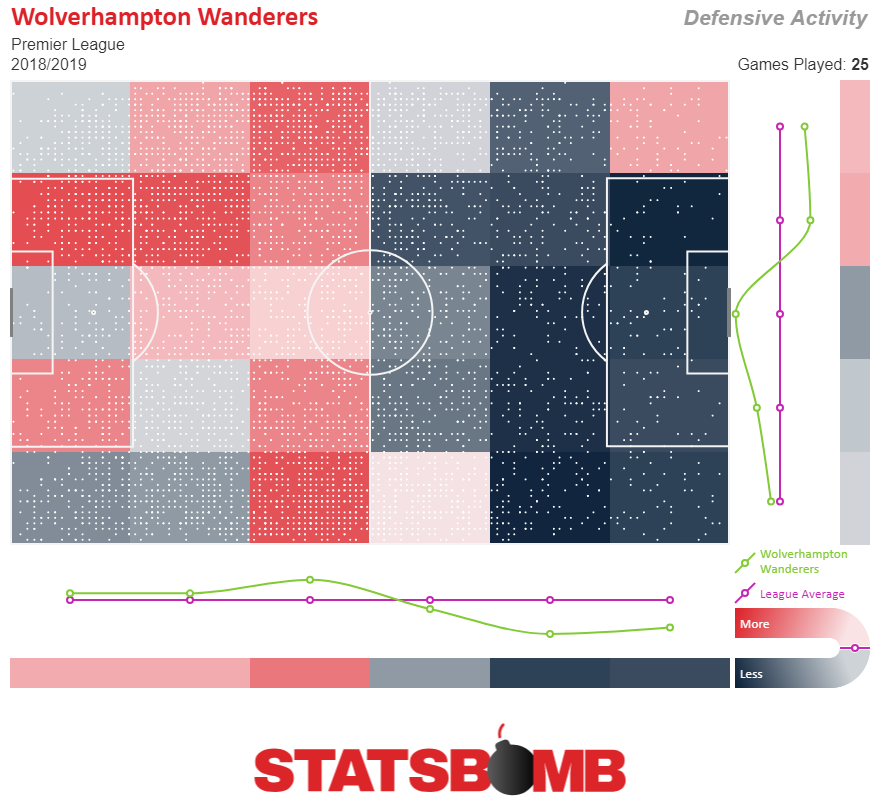 It’s a system that’s fairly indifferent to turning opponents over and much more concerned with making sure they can’t do anything with the ball when they have it. The side gives up a fairly average number of shots, 12.64 is only the ninth fewest in the league, but they give them up an average of 18 yards away from goal, further out than any other team. The result is an average xG per shot concede that’s the best in the league.
It’s a system that’s fairly indifferent to turning opponents over and much more concerned with making sure they can’t do anything with the ball when they have it. The side gives up a fairly average number of shots, 12.64 is only the ninth fewest in the league, but they give them up an average of 18 yards away from goal, further out than any other team. The result is an average xG per shot concede that’s the best in the league. 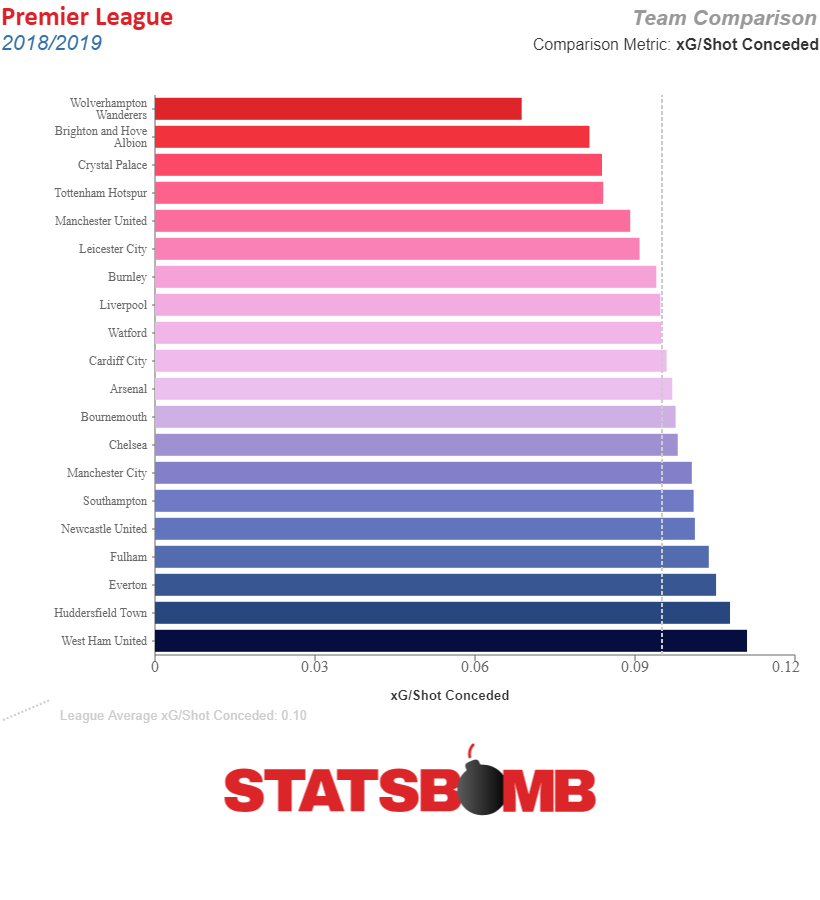 One way to clearly see how conservative Wolves are when it comes to positioning is to look at where their midfielders do most of their defending. Ruben Neves almost never pushes into opponent territory to try and pressure the ball.
One way to clearly see how conservative Wolves are when it comes to positioning is to look at where their midfielders do most of their defending. Ruben Neves almost never pushes into opponent territory to try and pressure the ball. 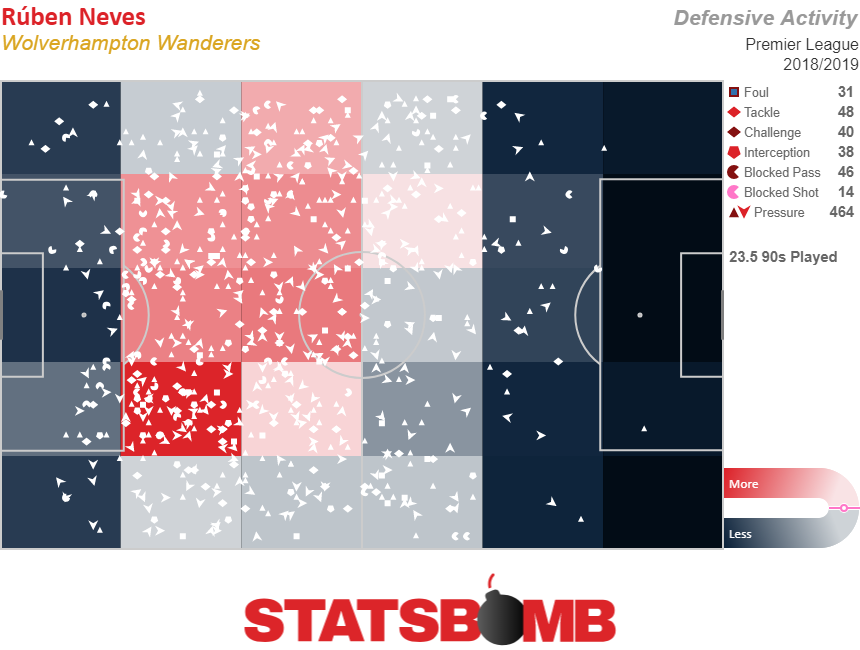 Joao Moutinho is even more concentrated on defending near his own box and covering for the occasional forays forward from Matt Doherty at right wingback.
Joao Moutinho is even more concentrated on defending near his own box and covering for the occasional forays forward from Matt Doherty at right wingback. 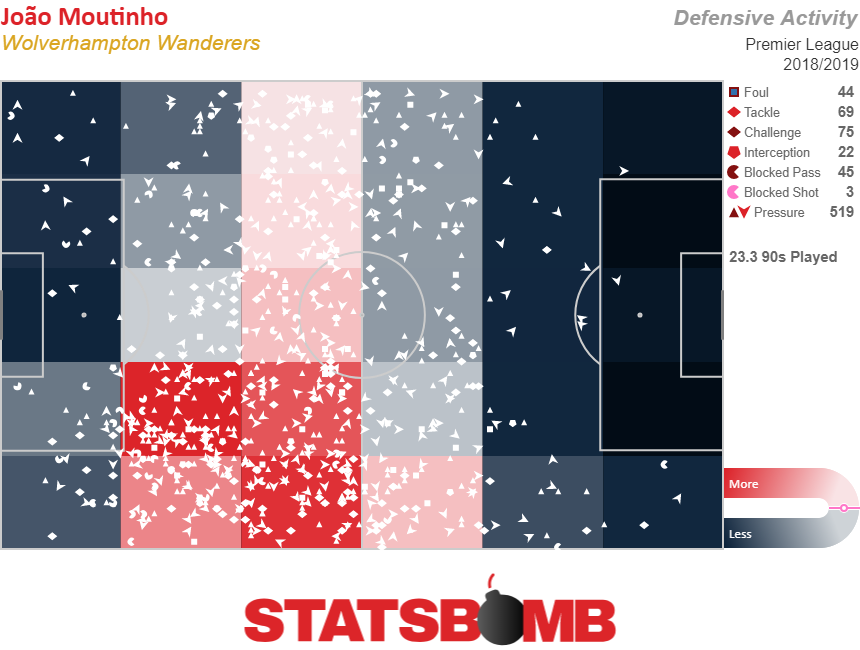 It’s not hard to understand what makes Wolves tick defensively. They’re conservative, they have bodies behind the ball, they are coordinate and difficult to pass through. What is difficult to understand is why, given how defensively they position themselves, they can generate any attack at all. It’s understandable that they allow 566 passes per match, the fourth most in the league, but how in the world do they manage 458 themselves, more than seven other teams. That’s the real magic, playing as defensively as they do while still managing to not get pinned deep for long stretches of time. Despite their defensive approach, Wolves are the seventh best attacking side, by xG, in the Premier League with 1.23 xG per match. Despite sitting deep they take the ninth most shots per match, 12.64 and with 0.10 xG per shot, are ninth in the league when it comes to average quality. Somehow, despite their defensive proclivities they still manage a shot chart that looks like this.
It’s not hard to understand what makes Wolves tick defensively. They’re conservative, they have bodies behind the ball, they are coordinate and difficult to pass through. What is difficult to understand is why, given how defensively they position themselves, they can generate any attack at all. It’s understandable that they allow 566 passes per match, the fourth most in the league, but how in the world do they manage 458 themselves, more than seven other teams. That’s the real magic, playing as defensively as they do while still managing to not get pinned deep for long stretches of time. Despite their defensive approach, Wolves are the seventh best attacking side, by xG, in the Premier League with 1.23 xG per match. Despite sitting deep they take the ninth most shots per match, 12.64 and with 0.10 xG per shot, are ninth in the league when it comes to average quality. Somehow, despite their defensive proclivities they still manage a shot chart that looks like this. 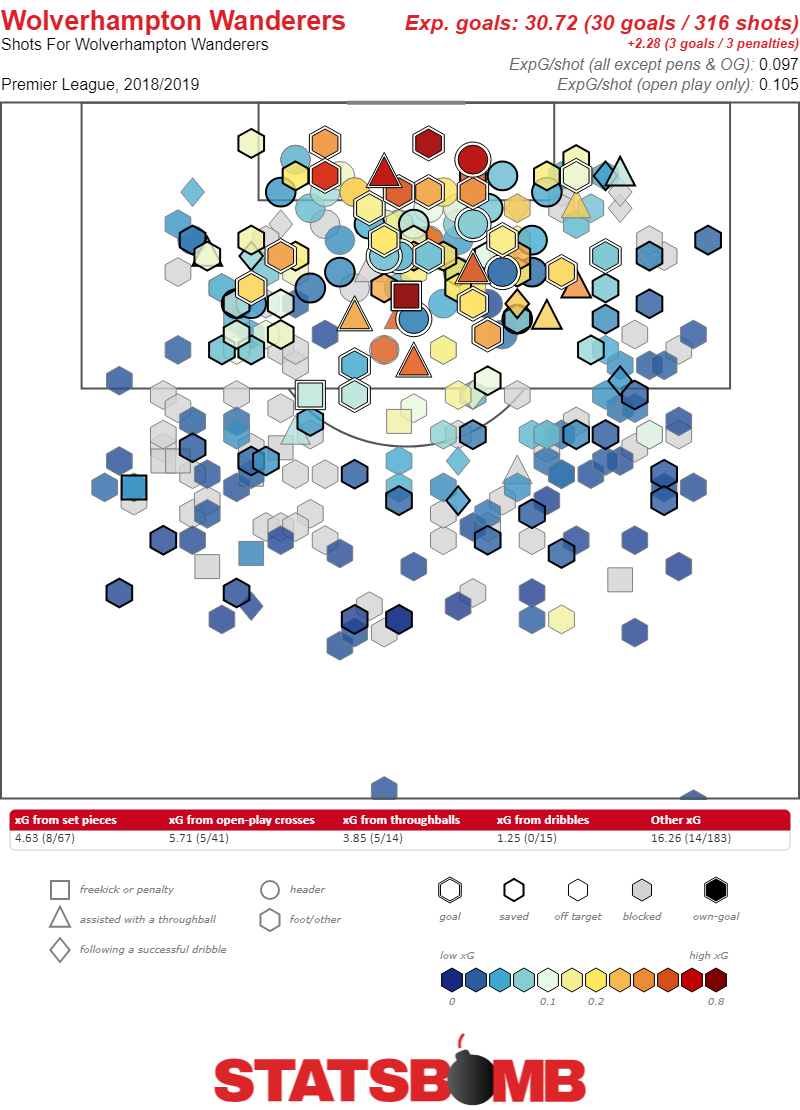 The key to this mystery, and the key to Wolves season, is that despite the fact they don’t press frequently, when they do press, they press very very well. Wolves generate an astonishing 3.52 shots per match from their high press (that’s defined as a shot generated within five seconds of a defensive action in the opposition half). The only teams that generate more shots via a high press are Manchester City, Liverpool, Chelsea, Manchester United, and Arsenal. Those are all teams that do a heck of a lot more defending up the field than Wolves do. Additionally, Wolves manage 2.64 clear shots per match, that’s shots with no defender between the shooter and the goalkeeper. That’s the seventh best total in the Premier League and again not what you’d expect from a team that is so dedicated to holding numbers in reserve. The problem many defensive teams have is that when they do break out they simply don’t have the numbers to effectively take on the opposition. It’s easy for a team to chronically find themselves trying to execute one against two or two against three in attack when they’re committed to a defense first approach. Wolves consistently overcome that deficit. The magic of Wolves is that they are a good attacking team despite the conservative approach they deploy to make themselves a great defensive team. They manage it by picking their spots defensively, and be extremely efficient at turning the few turnovers they do create into very good shooting opportunities. That creates a kind of virtuous circle. Teams aren’t quite as likely to throw numbers forward at Wolves because they can still get burned at the other end, but Wolves still manage to exploit defenses when they get the chance. Wolves might deploy a defense first approach, but their ability to pick their moments and create good chances off turnovers prevents it from becoming a defense only approach. Put it all together and it amounts to the newly promoted squad holding down a well deserved seventh place. Wolves are on the fast track to Europe, and with strong performances backed up by strong numbers, it’s quite clear they deserve it.
The key to this mystery, and the key to Wolves season, is that despite the fact they don’t press frequently, when they do press, they press very very well. Wolves generate an astonishing 3.52 shots per match from their high press (that’s defined as a shot generated within five seconds of a defensive action in the opposition half). The only teams that generate more shots via a high press are Manchester City, Liverpool, Chelsea, Manchester United, and Arsenal. Those are all teams that do a heck of a lot more defending up the field than Wolves do. Additionally, Wolves manage 2.64 clear shots per match, that’s shots with no defender between the shooter and the goalkeeper. That’s the seventh best total in the Premier League and again not what you’d expect from a team that is so dedicated to holding numbers in reserve. The problem many defensive teams have is that when they do break out they simply don’t have the numbers to effectively take on the opposition. It’s easy for a team to chronically find themselves trying to execute one against two or two against three in attack when they’re committed to a defense first approach. Wolves consistently overcome that deficit. The magic of Wolves is that they are a good attacking team despite the conservative approach they deploy to make themselves a great defensive team. They manage it by picking their spots defensively, and be extremely efficient at turning the few turnovers they do create into very good shooting opportunities. That creates a kind of virtuous circle. Teams aren’t quite as likely to throw numbers forward at Wolves because they can still get burned at the other end, but Wolves still manage to exploit defenses when they get the chance. Wolves might deploy a defense first approach, but their ability to pick their moments and create good chances off turnovers prevents it from becoming a defense only approach. Put it all together and it amounts to the newly promoted squad holding down a well deserved seventh place. Wolves are on the fast track to Europe, and with strong performances backed up by strong numbers, it’s quite clear they deserve it.
2019
Newly Promoted Wolves Stake Their European Claim
By Kevin Lawson
|
February 4, 2019